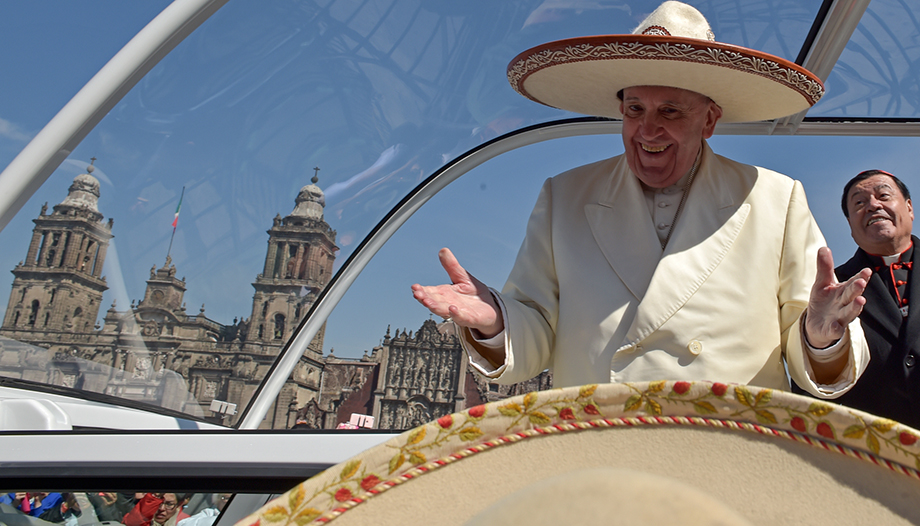Pope Francis was in Mexico for only five days. But if we were to examine everything he said during his visit, we would be astounded by the diversity and richness of his message. Of all Francis' trips, Mexico's was undoubtedly the most emphatic: a sort of compendium of the themes he has dealt with during his pontificate. The Pope had the opportunity to speak on each of the issues that have been at the center of his agenda: exclusion, ecology, migration, family. But on this occasion he added others to the list and offered an interconnected vision of all of them in the light of the Gospel.
Those who expected a political benefit from his trip were disappointed. With great skill, the Pope managed to slip away from those who wanted to take advantage of his visit to take water to their mill; I am referring to certain individuals and groups within the federal government, local governments, political parties, opposition groups, the media and large corporations. The most important aspect of his pastoral visit was not in the political order but in the moral and, above all, spiritual order.
The Pope said nothing we didn't already know about Mexico's problems: its ills are plain to see. Mexico is a nation burdened by poverty, corruption and violence. As a result, many Mexicans -fortunately, not all, it would be unfair to generalize- have fallen into lethargy, indifference and fatalism. But perhaps the worst of our vices is cynicism. In the crowded auditoriums where Francis offered this serious diagnosis, people who should feel alluded, sang and applauded, as if the Pope was talking about another country, another planet.
In the face of this discouraging scenario, Francis offered the enduring message of Jesus Christ: put God at the center of your life, love your neighbor, learn to forgive, do not negotiate with evil. Mexico is a largely Catholic country. One would expect these rules of life to be known by all or almost all. However, the sad truth is that Mexico is far from Jesus Christ. Who are those responsible? One could point to bad elements within the government, the oligarchy, the intellectual elites and even the ecclesiastical hierarchy. But I don't think there is much point in looking for culprits. Somehow, all Mexicans share, to a greater or lesser extent, the responsibility for our miseries. Instead of lamenting our misfortunes, we should look to the future. This is what Pope Francis invited us to do: to leave conformism behind, to believe in the possibility of change, to work together to build a better reality. There are Mexicans who are already committed to this project. Let us hope that the Pope's message motivates others to walk along this path of hope.
It would not be easy to choose the most important moment of Pope Francis' trip. The Masses in San Cristobal de las Casas -dedicated to the indigenous peoples- and in Ciudad Juarez -dedicated to migration- were very emotional and of a powerful social content. The two cities are geographical extremes of Mexico that also symbolize the extreme nature of the nation's reality. Even before his arrival, Francis stressed the importance of his pilgrimage to the Basilica of Guadalupe. Perhaps the most enduring image of his stay is that of the Pope praying in silence before the Virgin. Mexico is a fortunate people because of the permanent presence of the Virgin Mary of Guadalupe. In the hardest moments of our history, she has offered comfort to those most in need. She has also been a unifying agent of nationality. Mexico cannot be understood without the Guadalupana. But then a disturbing question arises: why, if we Mexicans are so Guadalupanas, have we distanced ourselves from Jesus Christ? Have we been bad children of the Virgin? Have we abused her mercy? It is difficult not to suppose that there is some truth in these conjectures. However, it would also be unfair not to recognize the difficult historical conditions in which Mexicans have had to struggle against all kinds of adversities. As Francis said, Mexico is a long-suffering country.
Mexico is the second most Catholic country in the world. Beyond the particular incidents of Pope Francis' trip to that nation, a complete evaluation of his visit will have to take into account the integral context of his pontificate. In the meantime, let us not lose sight of the fact that what Pope Francis said in Mexico is not only valid for Mexico: it is a universal message that should be heard by all humanity. Mexico gave the Pope the unique opportunity to formulate a speech that should serve as a guide for a world like ours, sunk in uncertainty and despair.
Philosopher, Universidad Nacional Autónoma de México.








